- News
- Reviews
- Bikes
- Accessories
- Accessories - misc
- Computer mounts
- Bags
- Bar ends
- Bike bags & cases
- Bottle cages
- Bottles
- Cameras
- Car racks
- Child seats
- Computers
- Glasses
- GPS units
- Helmets
- Lights - front
- Lights - rear
- Lights - sets
- Locks
- Mirrors
- Mudguards
- Racks
- Pumps & CO2 inflators
- Puncture kits
- Reflectives
- Smart watches
- Stands and racks
- Trailers
- Clothing
- Components
- Bar tape & grips
- Bottom brackets
- Brake & gear cables
- Brake & STI levers
- Brake pads & spares
- Brakes
- Cassettes & freewheels
- Chains
- Chainsets & chainrings
- Derailleurs - front
- Derailleurs - rear
- Forks
- Gear levers & shifters
- Groupsets
- Handlebars & extensions
- Headsets
- Hubs
- Inner tubes
- Pedals
- Quick releases & skewers
- Saddles
- Seatposts
- Stems
- Wheels
- Tyres
- Health, fitness and nutrition
- Tools and workshop
- Miscellaneous
- Tubeless valves
- Buyers Guides
- Features
- Forum
- Recommends
- Podcast
feature
8 reasons not to get disc brakes — find out the hassles before you switch
Disc brakes have become an increasingly important part of the road bike world over the past few years, but while the benefits of disc brakes are well documented, they bring with them challenges and problems too.
Here are some of the issues that we've experienced and heard about.
1 Disc brakes add weight
The all-up weight of a disc brake bike is higher than that of a rim brake bike.
Levers, brake callipers, hoses, fluid and rotors weigh more than an equivalent rim brake setup. Manufacturers often try to minimise the difference but don't forget that disc brake hubs are heavier too, and disc brake wheels are often built up with more spokes of a wider gauge, although the lack of a brake track means that disc-specific rims are generally lighter. The thru axles that are used with many disc systems are heavier than quick release skewers.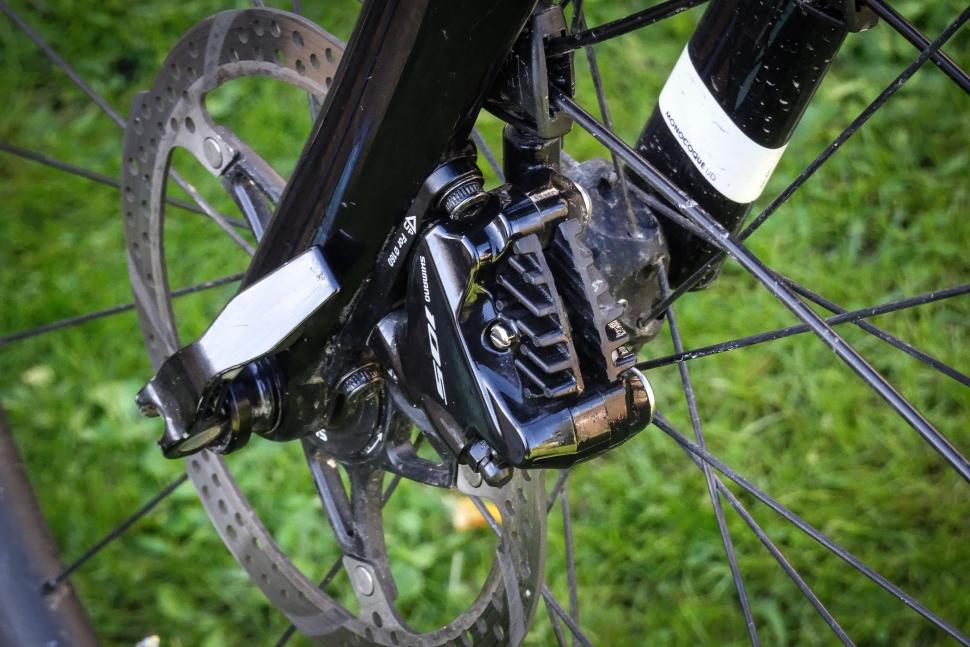
Read Everything You Need To Know About Disc Brakes
The weight difference isn't huge but it can often be around a pound over the whole bike when everything is taken into account.
2 Disc brake rub can be an issue
Early disc-equipped bikes borrowed the 74mm post mount standard from mountain bikes, where the brake calliper is simply bolted directly onto the frame or fork and adapters are used to accommodate different rotor sizes.
To try and improve the appearance of discs on road bikes, Shimano introduced its flat mount system. It’s an open standard that has been quickly adopted by other disc brake manufacturers. The vast majority of new disc brake road bikes are flat mount.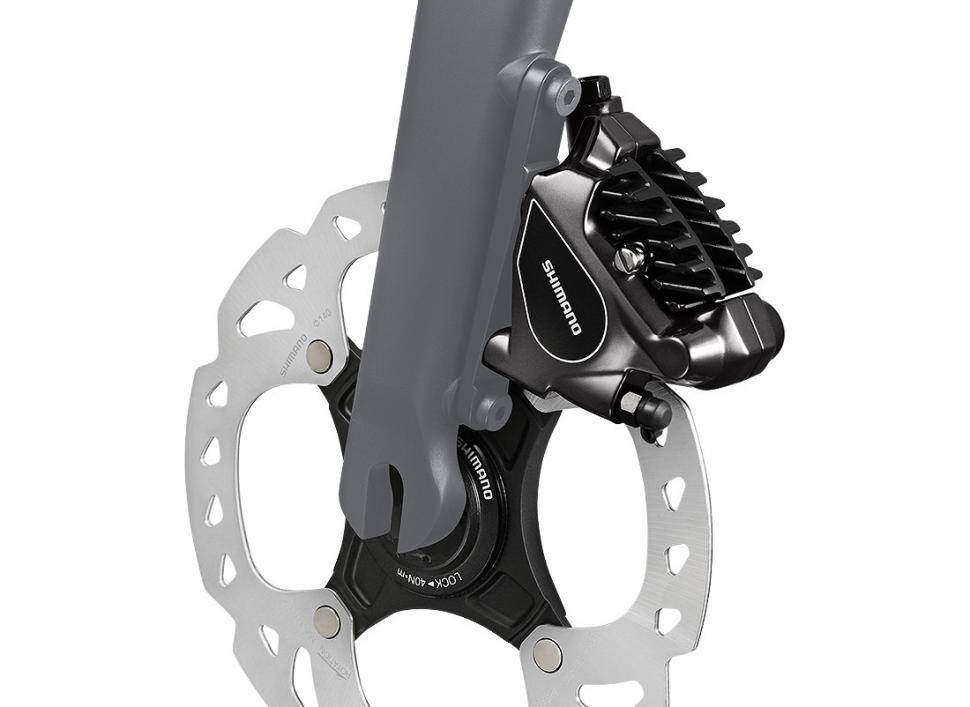
“[Flat mount offers a] smaller and more compact interface with the frame/fork for improved integration, reduced weight and better tool access for easier adjustment,” Shimano told road.cc.
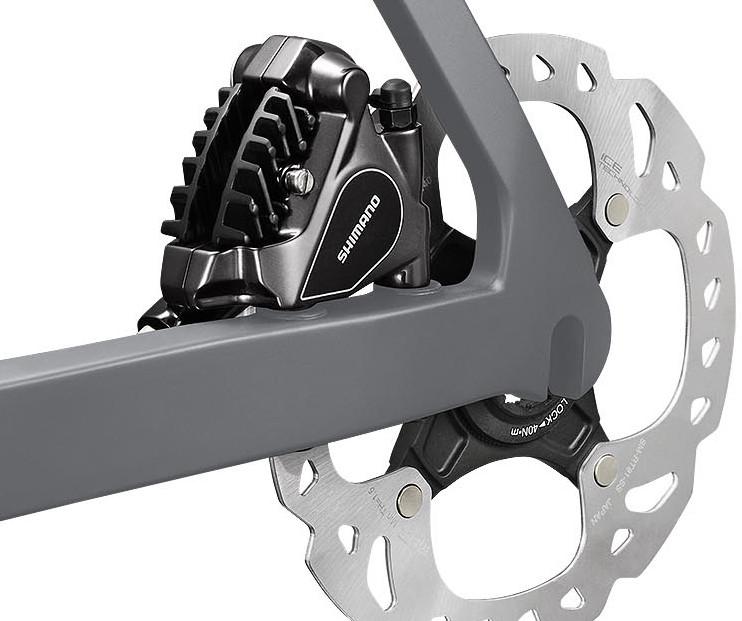
There’s no doubt flat mount disc callipers are smaller, better looking and lighter than the bulkier post mount callipers. The actual calliper mechanism is identical and there are no changes to the way the hose connects and the brake pads are installed. The key difference is in the way the calliper is mounted to the frame.
Where post mount callipers are bolted from above directly into the frame and fork, flat mount callipers sit flush with the frame and fork and the bolts are threaded in from below and directly into the calliper, pulling it down onto the frame. At the front, the calliper is fixed to a thin adapter which is bolted to the fork.
Depending on frame design and disc rotor size, post mount often needs a large and ugly adapter to provide the correct spacing over the rotor. On mountain bikes with many different frame designs and more rotor sizes in use, that versatility is a good thing, but the road market leans towards just 140mm and 160mm rotor sizes, for which flat mount has been designed.
We’ve had mostly good experiences with flat mount on the disc-equipped bikes we’ve tested, but there have been a couple of incidents of brake rub, and there's nothing more annoying.
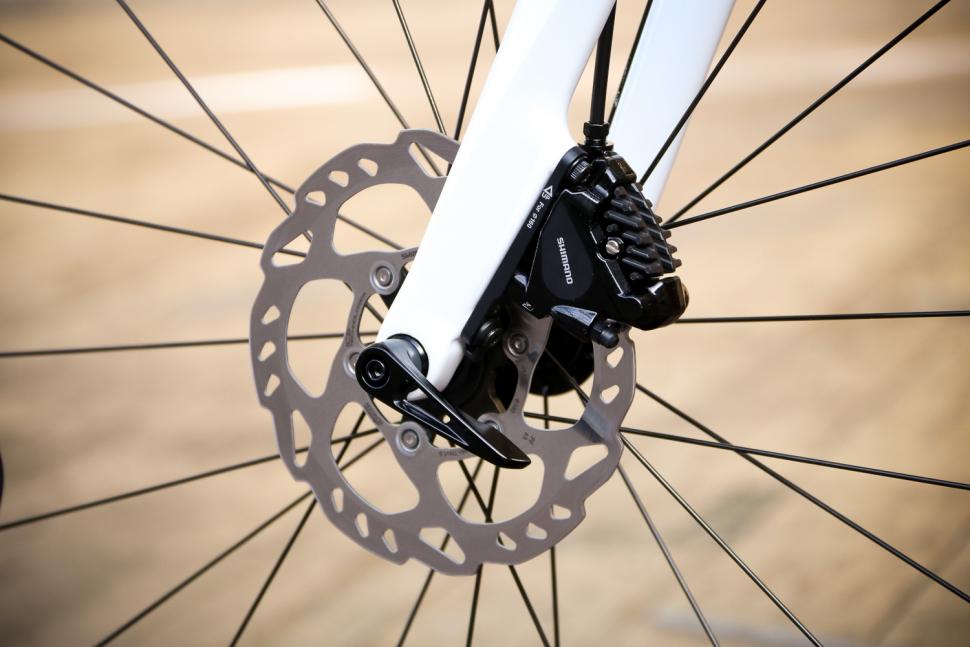
We asked Shimano about this problem and it told us that cleanly faced mounts are very important.
“As with post mount, a plane contact area (facing) always helps, as does the size of the disc (smaller is better). Centerlock rotors on good stable axle bearings (compared to 6-bolt rotors on lightweight hub axles) also help with alignment. The construction of the fork is also important (stiffness balance left/right),” said Shimano.
You'd hope a frame or fork manufacturer would make sure that the contact area was right, but in our experience this isn’t always the case.
Facing tools ensure the brake mounts on the frame and fork are smooth and level and provide perfect alignment. They're expensive and not really suitable for most home mechanics, although all good bike shops should be able to help you out here. Park Took does an adapter for its DT-5.2 Disc Brake Mount Facing Set and you can see it in action in this video.
The other solution to disc brake rub is to adjust the calliper on the frame/fork. With post mount it’s relatively easy: just slacken off the bolts, pull the brake lever and tighten the bolts to centre the calliper over the rotor.
“The range of adjustment for flat mount is the same as for post mount," says Shimano. "The difference is that the side-to-side adjustment is no longer on the calliper but in the slot hole instead. Shimano recommends that this hole is 4 x 5.2mm (+/- 0.1mm) but sometimes manufacturers don’t follow these recommendations. For the front calliper the adjustment is in the adaptor plate with the same hole dimensions.”
Not all manufacturers are adhering to the requirements as closely as they should. In many cases, the flat mount range of adjustment appears to be less than in post mount systems. We like flat mount but it does mean you are at the mercy of bike companies ensuring the mounts are manufactured correctly.
3 Disc brakes affect aerodynamics
Like any other external component, disc brakes affect aerodynamics. Some manufacturers have stated that the rim brake version of a particular bike is more aerodynamically efficient than the disc brake model, but it's not as simple as saying that rim brakes are always more aero.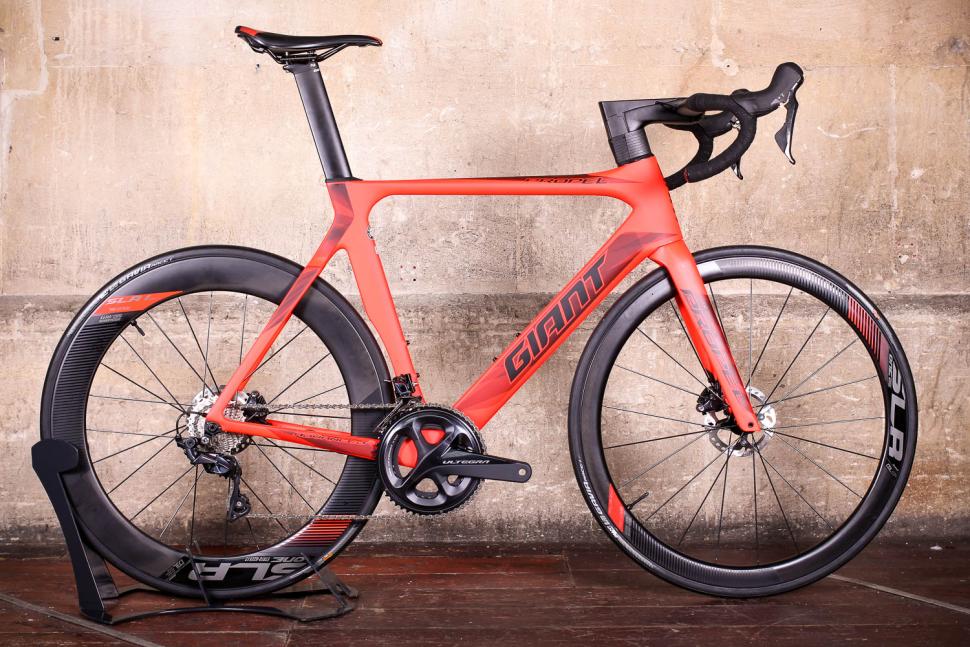
When Giant revealed its Propel Disc in 2017, for example, it said, "Engineers found that, with proper integration, a disc-brake design can actually improve aero performance compared to rim-brake configurations.
“This is because the location of traditional callipers (either in front or behind the fork crown/ legs) creates 'dirty' air'. Opening up the fork crown area (by placing the disc-brake callipers down at the hub) means that the air hitting the new disc-brake calliper has already been disrupted by the leading edge of the tyre/wheel. This effect is further enhanced by an asymmetric fork that helps smooth out airflow over the calliper.”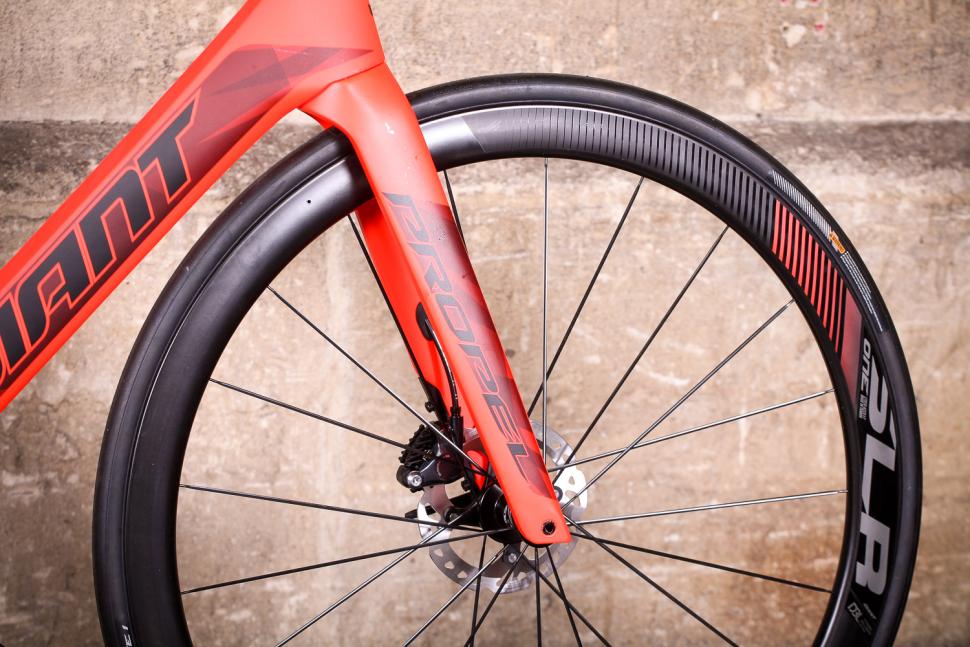
A handful of new aero road bikes, like the Cannondale SystemSix and 2019 Specialized Venge, are disc brake-only.
4 Choosing pads is a minefield
Switch to a disc brake bike and you'll eventually have to choose new pads... and that's a minefield.
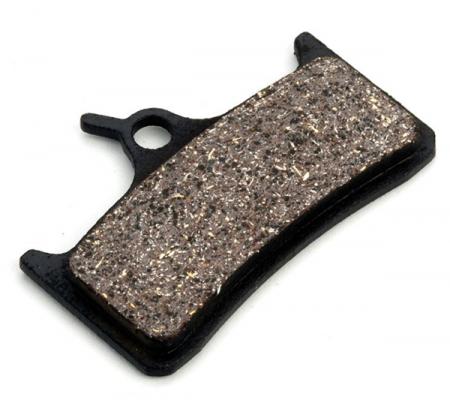
All pads are made by mixing various powdered additives with a binding agent and then squashing it all together at high heat and pressure to form a solid block on the backing pad. What's in the mix of powders has a major effect on the pad's properties.
Most new bikes come fitted with resin pads. They're made from non-metallic additives such as rubber, glass, carbon and Kevlar to provide an all-around pad that works for most people but isn't very durable under hard use.
Find out more about disc brake pads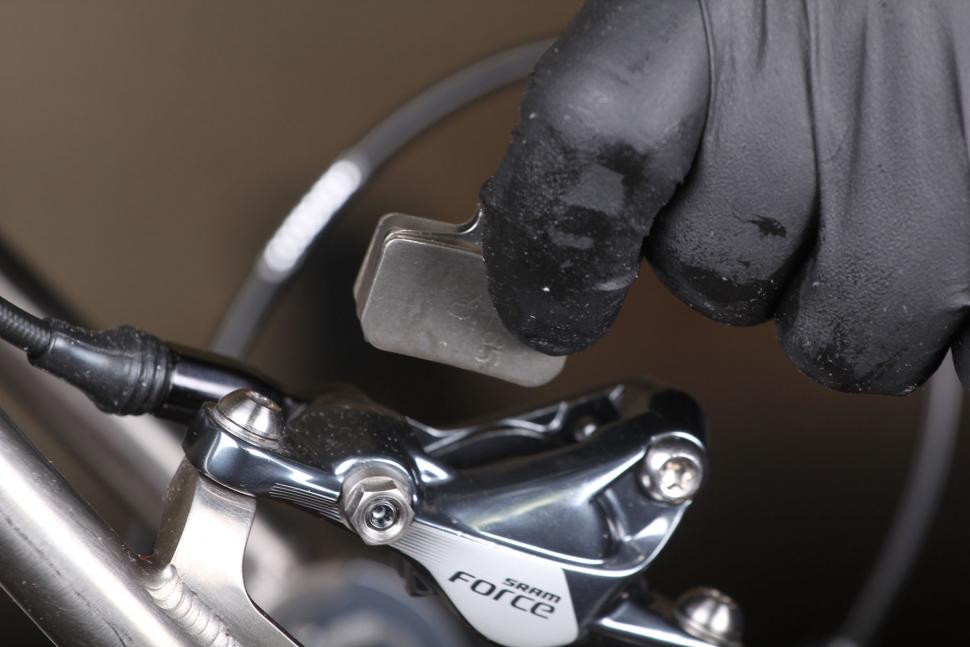
If you live anywhere hilly and/or ride in all weathers then you're probably better off switching to more expensive but much longer lasting sintered pads. Also known as metallic brake pads, these use a very high proportion of metallic fillers such as copper, steel and iron. They provide strong, effective braking at high pad temperatures although their bite can be poor when they're cold and they'll wear out your rotors quicker than resin pads.
5 You need to bed in new brakes
New disc brake pads and rotors don't immediately perform to their full potential – they need bedding in first. This is a process that distributes pad material over the rotor to increase the friction, and maximises the contact area between the two surfaces.
Here's how to look after disc brakes to get the best performance out of them
Thankfully, bedding in is pretty straightforward. Here's SRAM's advice:
"Accelerate the bike to a moderate speed and then firmly apply the brakes until you are at walking speed. Repeat this process 20 times. Then accelerate the bike to a faster speed and apply the brakes until you are at walking speed. Repeat this process 10 times. It’s important that during this process you never come to a complete stop or lock up the wheels at any point."
This will improve the performance of your brakes massively and prepare them for normal riding.
6 Maintenance involves a new set of skills
Chances are that you know how to adjust rim brakes and swap the pads, and probably how to change the cables too. You might have been doing it since you were a kid. Depending on your cycling background, disc brake maintenance might be entirely new to you.
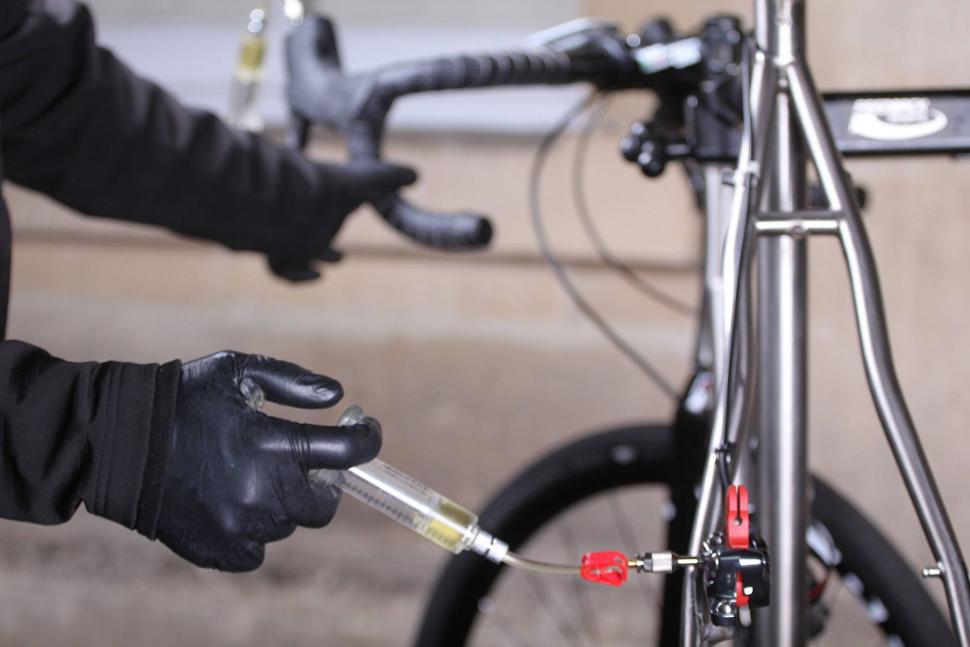 One issue you could encounter with hydraulic disc brakes is a soft and mushy feel because of air in the system. This requires bleeding and means either a trip to a bike shop or shelling out on a bleed kit. Each manufacturer has its own bleed kit. Shimano and SRAM, for example, use different techniques and fluid.
One issue you could encounter with hydraulic disc brakes is a soft and mushy feel because of air in the system. This requires bleeding and means either a trip to a bike shop or shelling out on a bleed kit. Each manufacturer has its own bleed kit. Shimano and SRAM, for example, use different techniques and fluid.
Bleeding a hydraulic disc brake system isn't the most onerous of tasks but you will need to get the hang of it while following a guide or watching one of our videos.
7 They can squeal!
It's true that rim brakes can squeal but we reckon that disc brakes are worse offenders.
The most common cause of disc brakes squealing is contamination of the rotor or pads. You have to be careful when using spray lubricants on a bicycle with disc brakes, or avoid them altogether.
Find out how to stop your brakes squealing
“Cleaning your rotors regularly with a specific (oil-free) disc brake degreaser is a good way to avoid squealing brakes," says Shimano. "Cleaning your pads too can help quieten things down — you can try some sandpaper or grinding the pads — but if the grease has soaked through the pad, you might need to replace them. Don't use a degreaser or chemicals on brake pads, though.”
It’s harder to clean disc brake pads than rim brake pads, largely because you have to remove them from the bike in the first place.
What's the best way to clean disc brakes?
Squealing pads can also be a sign that the pads are worn out. It's a little more tricky to take a close look at disc brake pads than it is with rim brake pads, although taking the wheel out can make the task easier.
8 Rotors wear out... eventually
One of the advantages of disc brakes is that they don't wear out the rims of your posh carbon wheels, but don't forget that you will wear out the disc rotors. Thankfully, rotors aren't particularly expensive.
Different brands give different minimum thicknesses for their rotors (the figure is often printed on the rotors). Go beyond that limit and things become dangerous, so keep an eye on 'em.
Mat has been in cycling media since 1996, on titles including BikeRadar, Total Bike, Total Mountain Bike, What Mountain Bike and Mountain Biking UK, and he has been editor of 220 Triathlon and Cycling Plus. Mat has been road.cc technical editor for over a decade, testing bikes, fettling the latest kit, and trying out the most up-to-the-minute clothing. He has won his category in Ironman UK 70.3 and finished on the podium in both marathons he has run. Mat is a Cambridge graduate who did a post-grad in magazine journalism, and he is a winner of the Cycling Media Award for Specialist Online Writer. Now over 50, he's riding road and gravel bikes most days for fun and fitness rather than training for competitions.
Latest Comments
- Laz 1 hour 15 sec ago
hopefully, that will be the last time we see that van in drivable condition
- Nick T 2 hours 16 min ago
Come again chief? The Tarmac in size 56 has a 73.5 degree HTA, the Addict in the same size comes in at 73.4 degrees. In terms of bike fit that's...
- TheBillder 3 hours 58 min ago
My new double glazed wooden framed sash windows are £1600 plus vat per (quite large) window. House built in 1904. The cost includes fitting and...
- galibiervelo 4 hours 14 min ago
We promote #bikefriday You dont need it - go for a spin. Nice bikes and kit are lovely, but not as noice as a dawn spin this friday morning with a...
- David9694 4 hours 17 min ago
Council acting like ‘the Sheriff of Nottingham’ with parking charges...
- David9694 4 hours 21 min ago
Man taken to hospital after vehicle crashes into pub...
- David9694 4 hours 31 min ago
Car flips in Millennium Way, Sheerness, near former Aldi supermarket that reopens as Home Bargains this weekend...
- RoubaixCube 5 hours 36 sec ago
Ive been using the same £2-3 dish brush I bought from wilko, tesco or pound land for as long as I can remember. I dont understand why anyone would...
- S.E. 6 hours 35 min ago
I'm thinking CX tyres...
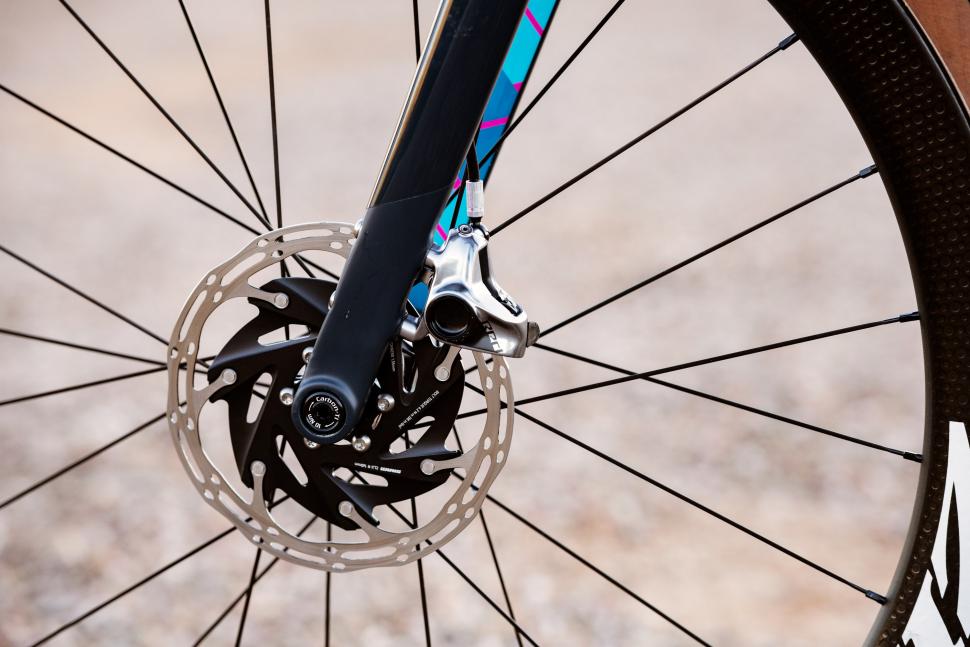
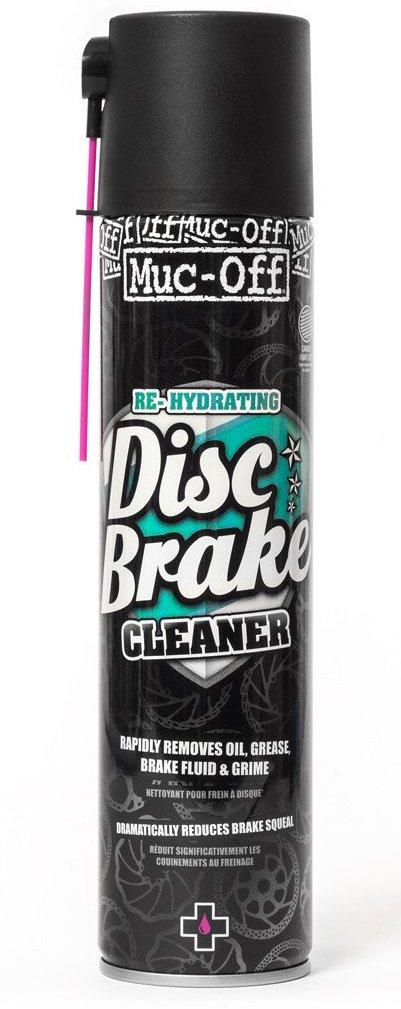
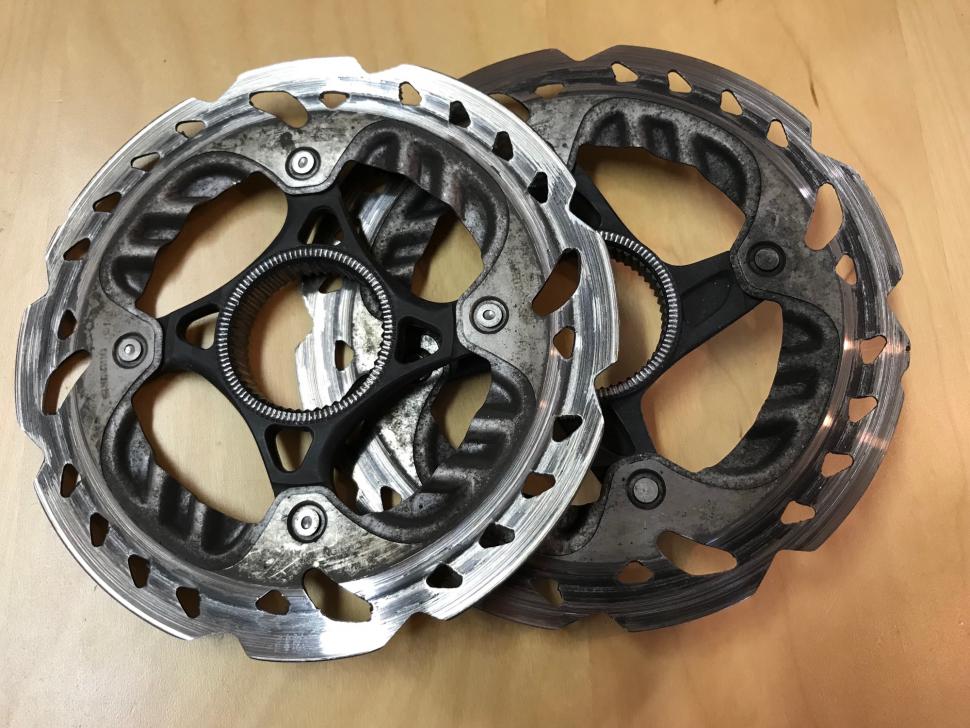
Add new comment
206 comments
I dislike the noises that my diskbrakes make, the little whine on the rear, and the howl that the front gives when wet or at the bottom of a descent. But the noise I really hated on my canti brakes (apart from the screams when badly aligned, mostly on the front) were the grinding noises when in any way wet or muddy, which I knew was the sound of my rims being eatten away.
The last set lasted less than a year of commuting, admittedly a shockingly wet and muddy autumn, winter and spring.
Discs all the way, bleeding is a bit of a faff but not difficult and only needs doing if changing a lever or calipers which is not very often. Perfomance is leaps and bounds better than rim brakes in every situation.
Not sure what rim brake caliper/pad combination you were using, but all my rim brake bikes stop in rain, snow or mud. They don't squeal either. Easy to adjust on the fly as well. Rim brakes are aesthetically nicer.
I find, like you, I don't have any issues with locking up wheels on rim brakes, especially in the wet.
I have ridden hire bikes with disc brakes and they stop just like rim brakes. Certainly not in any way better, in fact I didn't really notice them after the first couple of hours.
But it is getting more difficult to buy a new steed with rim brakes unless you go the custom route, which I did two years ago.
Seriously, is this article from 2014? Author was up against a deadline and had no new ideas for a topic? And how did they forget "they will cut you to the bone every time you crash?"
I thought the whole point of brakes was to make a bike slower?
I do like the V-brakes on my ageing MTB though I suppose it's just a matter of time until my rims decide they've had enough of them.
I think road disc brakes really come into their own with carbon wheels - the designers don't need to worry about the braking surface and can just go for strength and aerodynamics.
why do you use disc brakes on the tourer, if rim brakes give equal performance, and with the benefits you list, why would you accept worse brakes?
A salutary warning but as you suggest in the last paragraph it seems to be much more to do with exceeding the weight limit for the wheelset; even good quality gravel wheels often have a max weight limit of around 120kgs, cheap ones will be much lower. I'd suggest that the same rim with a disc brake hub would probably do the same. I helped a heavier friend a while ago source tandem wheels for his bike and they have worked perfectly for him (with rim brakes). Still, discs are definitely the best option for in-wheel-motor ebikes as they spin up a lot more torque than most riders can put through the system.
I am surprised that
ShimanoGiant took a product to market with an unfixable problem. FTFY.Did you complain this much when your favourite frame suppliers replaced center pull for side pulls? Or when V-brakes replaced canti's?
Life moves on - so should you.
Manufactures and shops need to make money. Chances are when you see something massively discounted its the rim braked model. They just dont sell anymore.
doubt they know.
in wet conditions disc brakes perform so much better than rims and here is a person claiming the opposite >.>
Sounds like you are enjoying well sorted brakes (rim brakes not squealing) better than poorly sorted brakes (squealing disc brakes). Who doesn't?
totally agree, my disk brakes can be as noisy as they like,though sintered pads quiets them down alot, because that grinding metal noise the rim brakes make during the winter months are my wheels slowly self destructing. my next commuter bike will be mechanical disk brakes for sure as it just cuts the hassle of constant rim block maintenance for 6 months of the year.
I agree. If You exceed the weight limit and add wear to the rim it's bound to fail. Running 2.0 tyres at 60 to 70 psi probably doesn't help much either.
Ryde Andra 30 or 40 rims take it all in their stride though.
No, I'm only 39, 😂
I've only had to live through the transition from V-brakes to disc brakes on MTBs, which at least made significantly more sense from a braking power/arm pump point of view (I remember trying the Ft William World Cup DH track with V-Brakes)
V-brakes and cantis are interchangeable so that's irrelevant, and you can still buy high quality cantis quite easily.
But I'm Ill qualified to try and rebut your last argument which seems to boil down to 'capitalism'. Don't want to be branded some sort of pinko commie just because I don't like squeaky brakes 😂
Wish it were so, my disc brakes are as well set up, cleaned, adjusted and bedded in as possible, and I'm no newbie to discs having ridden and raced mountainbikes for more than 10 years.
Discs just seem inherently prone to squealing in wet cold conditions. Am happy to accept it's some combo of my weight and frame size that's maybe contributing to increased resonance or something, but I had to give up spending money on new pads, rotors and even different manufacturers of brake (SRAM, TRP and Shimano) as they were all the same in those conditions.
I await the brave journalist or manufacturer who acknowledges the issue and attempts to offer a solution, perhaps a system which offers enough space behind the pads to allow a layer of automotive anti-squeal tape, I tried it but even TRP Spyres didn't have enough adjustment to squeeze it in.
Some of the comments on here beggar belief; you don't have to like/use discs, but they ARE just better. Offering consistent braking in all weathers. So they may squeak in the wet. So what?
And I say that as someone who has just bought a 2019 TCR Advanced, with rim brakes; but that is for summer/dry conditions. Any sign of rain/wet and the disc braked bike comes out.
"Disc brakes - unnecessary hassle with virtually little improvement in braking - in the wet."
Try reading with understanding!
I have Kool stop salmon pads on another rim brake bike and they
are as good as my Ultegra hydraulic disc brake bike.
Have to say my experience is the complete opposite. Disc brakes in the wet are far superior than rim IMHO.
That's not to say that rim brakes don't work OK in the wet depending on your rim / pad combination it's just that IME discs are better.
Because noise is a sign of mechanical ineptitude. Noise is dumb. Noise is how a lorry with drum brakes sounds. Noise is the worst thing in the world, if I want my mutil thousand dollar high performance machine to sound like I purchased it from some big box store and had it assembled there, I might as well purchase one there. I don't tolerate the brakes squealing in my car, why would I tolerate it on something I purchased for pure enjoyment. I paid my money for my bike and it is MY requirement that my bike does not sound like some old piece of construction equipment, AND, the rim brakes I have been riding have been proven for multiple decades to be just fine. So I lose a little wet perfomance. Been cycling in the wet for 45 years, I think I know how to handle it, especiallly since I am not being paid to ride my bike. Why is choice bad? I want rim brakes, you want disc so what each to their own.
How anyone can say they look better is staggering. This design is just hideous.
Like most things in life, there are good and bad versions of everything. My Giant Propel has fantastic rim brakes, easily enough power to stop me dead in the dry. When I bought the bike, a disc braked version didn't exist, but it would have cost more and would have meant going without something else on the bike. Probably 105 instead of Ultegra, and I am more than happy with the rim brakes it has and Ultegra.
Rear wheel skid or front wheel lock up? I suspect the rear, because a front wheel skid normally results in a crash. I assume you are aware that weight shifts forward when braking, and this is even more significant when going downhill.
I have never accidentally locked up the front wheel on tarmac, I have frequently wished for better braking in the wet from bikes with rim brakes.
I think that is an important point. Discs are great, but are not something you can upgrade to without buying a whole new bike. I'd not buy a new bike without them, but I would not buy a new bike just to get them.
For this reason, it seems a bit short-sighted for manufacturers (looking at you Shimano) to have thrown in the towel on rim brake wheels and groupsets.
I agree with noise and disc brakes. Who needs a bell? A touch of the brake levers and my MTB sounds like a 10 ton gravel truck making a panic stop. Pedestrians jump out of the way in panic.
Personally I think they are aesthetically nicer on and compliment the organic curves of composite framed bikes or those with large section profile tubing. Certainly anything with composite rims, it's a no brainer to go down the disc route.
Skinny, straight steel however? I'd probably stick with the old fashioned style of rim brakes and performance be damned.
That's a question of maintenance rather than kit. I've got rim brakes that squeal and discs that don't. My rim brakes need some attention.
Well change it then
Talking from my own point of view (and as someone who has not - yet - got a bike with disc brakes) you've lost me there. Certainly pre-pandemic, most of my cycling was my 14 mile e/w daily commute - so a lot of my cycling would be in wet weather, and I certainly couldn't pick and choose.
There seem to me to be two big advantages to disc brakes for the average rider - better braking in the wet, and longer life for your wheels. These seem pretty big advantages to me, and that's why I'm buying a bike with them.
I do, however, tend to agree that the advantages for the pros seem less clear.
I agree entirely. I have never had braking issues on my rim brake road bikes. They are so easy to maintain, too. I have discs on my gravel bike, which are great for off-road. But.... they are a pain to maintain by comparison and highly prone to damage in transport. Pro teams use them as much because their bike sponsors require them to as for better braking. Huge compatibility issues with neutral service and slower wheel changes. There is no need for the average roadie to have discs except to follow the fashion.
Pages